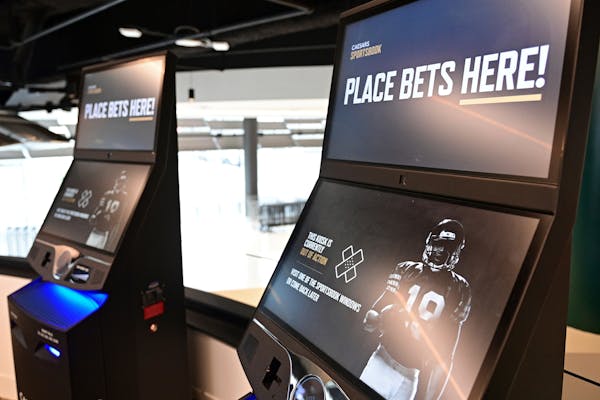Key Democrats released their plan Tuesday to give sports gambling licenses exclusively to the state's American Indian tribes, allowing betting at their casinos and on mobile devices, but not at the state's two racetracks, an exclusion criticized by Republicans.
Rep. Zack Stephenson, DFL-Coon Rapids, said the Legislature is "back to finish the job" it started last year when the House passed his bill but the Senate did not.
Senate sponsor Matt Klein, DFL-Mendota Heights, said, "Minnesotans are demanding sports betting really, and they are in many cases already accessing it on a black market. And much as with Sunday [liquor] sales a number of years ago, they often don't understand why their wishes are being obstructed by government and creating inconveniences in their lives."
The bill still faces trouble in the Senate, where the DFL controls the chamber by a single vote. At least one Democrat, Sen. John Marty of Roseville, said he doesn't want to expand gambling and Republican votes may hinge on the inclusion of the two tracks.
Rep. Pat Garafolo, R-Farmington and the self-proclaimed "Godfather of sports betting," said without the involvement of Shakopee's Canterbury Park, he can't vote for it.
"And if I'm not voting for it — it is difficult to imagine any other GOP member does," he said in a statement echoed by Sen. Jeremy Miller, R-Winona, the sponsor of a separate legalization bill.
Garafolo also objects to the bill's provision allowing in-person sports betting at age 18, calling it a very bad idea. Age 21 would be the threshold for mobile betting.
The DFL bill would allow each of the 11 tribes one sports betting license to partner with a mobile gambling platform, such as FanDuel, DraftKings or Caesars.
The state's professional sports teams and the Minnesota Indian Gaming Association (MIGA) announced their support for the proposal in letters.
Klein said the bill creates a trustworthy, safe market for sports gambling with "sufficient guardrails around problem gambling." He acknowledged that he doesn't yet have the votes for passage but, "I take it as my charge to get it across the finish line."
Since the U.S. Supreme Court cleared the way for legalized sports betting with a 2018 ruling, more than 30 states have legalized it in some fashion, including all of Minnesota's neighbors and Canada.
DFL Gov. Tim Walz thanked the sponsors and said in a statement, "Whether it's cannabis or sports betting, I firmly believe that adults should be able to make their own decisions."
In their letter, Minnesota's sports teams supported tribal exclusivity and signaled they would oppose allowing non-tribal entities to obtain sports betting licenses. The letter was signed by leaders of the Minnesota Lynx, Timberwolves, Twins, United, Vikings and Wild.
Twins President Dave St. Peter said the professional teams have deep, longstanding relationships with tribes and recognize their exclusive rights to run gambling operations in Minnesota. The pro teams will benefit from partnerships with the tribes, advertising and fan engagement, he said.
"They're going to want to promote their sports betting platforms where the fans are at," St. Peter said.
The teams also like that the bill creates a "robust marketplace" with licenses available to each tribe. Another provision in the bill would prohibit betting on injuries or penalties to ensure that games are played with "the highest level of integrity," St. Peter said.
Vikings Vice President Lester Bagley said the teams "aren't pounding the table" for sports betting, but if it's legal, it should honor tribal exclusivity and contain consumer protections.
What sports betting won't do, according to the DFLers, is provide significant tax revenue. Using the fiscal analysis on last year's bill, Stephenson estimated it would bring in up to $12 million a year to the state with the proposed 10% tax on net revenue.
The first cut of that revenue would go to cover the cost of administering and regulating gambling. Of the remainder, 40% would go to address problem gambling and 40% to youth sports programs.
One of the state's two racetracks, Running Aces in the northern metro, responded that the track's future depends on being in on the expanded gambling options. "A sports betting bill that excludes Running Aces jeopardizes the future of the horse racing industry in Minnesota," CEO Taro Ito said in a statement.
Randy Sampson, CEO of Canterbury Park in Shakopee, said in a statement that the Minnesota gambling market is strong enough to aid the tribes and to use for enhanced purses at the tracks. "This combination will provide the broadest possible economic benefits for the state," he said.
The bill needs to be vetted by and win approval from multiple committees in both chambers before it comes up for floor votes, Stephenson said. He doesn't expect votes in either chamber before April.
Former DFL Senate Majority Leader Kari Dziedzic dies of cancer at age 62

How the Star Tribune is covering the 2024 election

Fact check: Walz and Vance made questionable claims during only VP debate

In Tim Walz's home city, opposing groups watch him debate on the national stage

